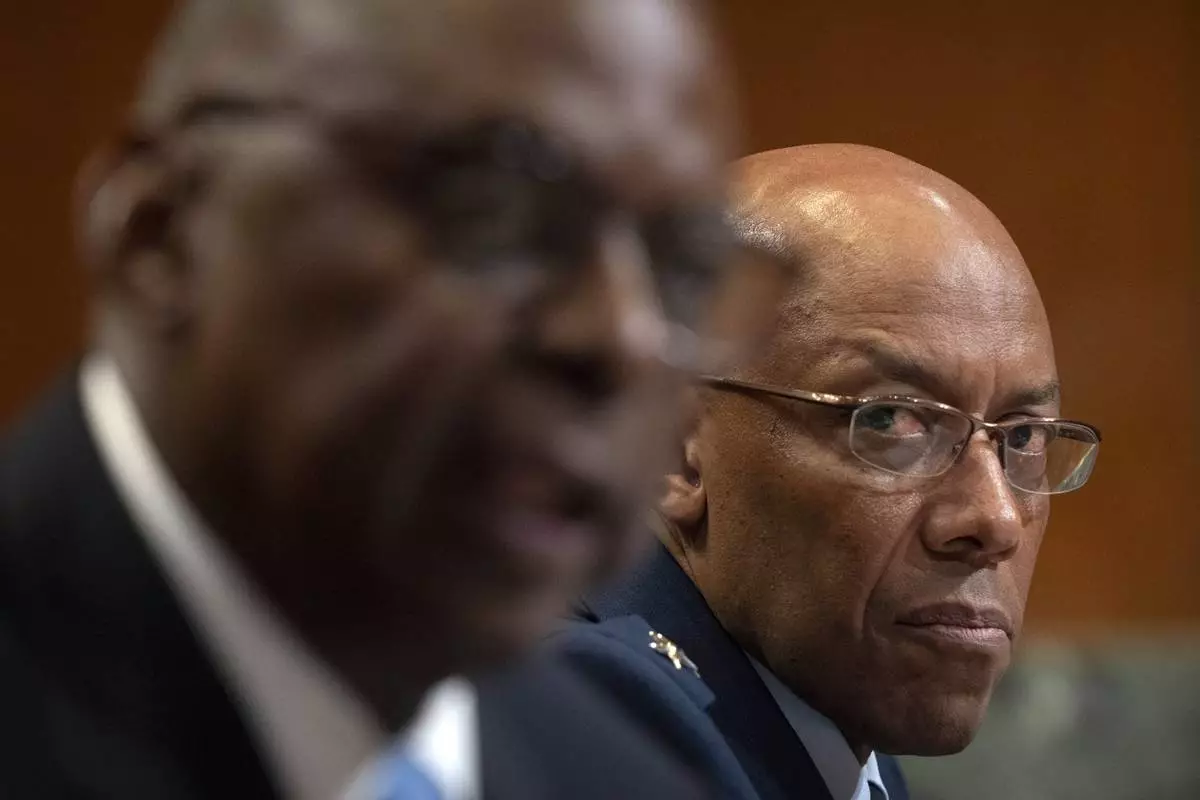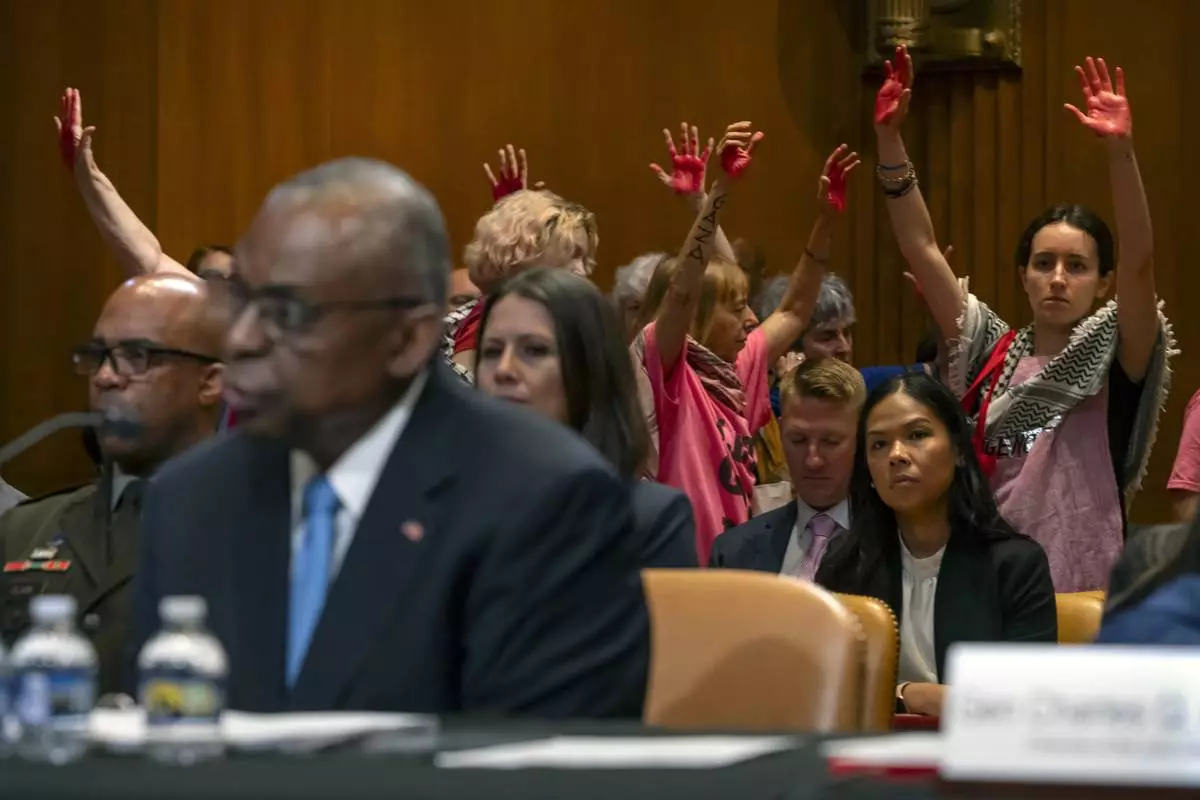Last year, proponents of limiting partisan politics in the creation of electoral districts needed to win over Justice Anthony Kennedy. They couldn't.
The issue is back before the Supreme Court again, with arguments on Tuesday, and it might be harder than ever to convince the justices to rein in the practice known as partisan gerrymandering, designing districts to benefit one political party.
A new round of redistricting awaits after the 2020 census, and the court's decision could help shape the makeup of Congress and state legislatures over the next 10 years.
With Kennedy retired, the question is whether federal courts will remain open at all to complaints about political line-drawing.
"The question of what the outcome will be in light of recent changes in the membership of the Supreme Court is anybody's guess," said Seth Waxman, the former lead high court lawyer in the Clinton administration and a supporter of limits on drawing districts for partisan gain. Justice Brett Kavanaugh is in Kennedy's seat.
Chief Justice John Roberts is now the court conservative closest to the center and the focus of the arguments for reining in partisan redistricting, said Michael Kimberly, the lawyer for Republican voters who challenged a Democratic congressional district in Maryland.
"The concern now is persuading him," Kimberly said, acknowledging Roberts' skepticism about the court's involvement in the issue during arguments last term.
Critics of partisan manipulation of electoral maps say that when one party controls redistricting, it can exaggerate and entrench its power, even in states that are otherwise closely divided between Republicans and Democrats.
Republicans were the big beneficiaries of the most recent round of redistricting in 2011, following the once-a-decade census, because they scored resounding victories in the 2010 elections.
The court has before it two cases, from Maryland and North Carolina, with strong evidence that elected officials charged with drawing and approving congressional districts acted for maximum partisan advantage. In North Carolina, Republicans ran the process and sought to preserve a 10-3 split in the congressional delegation in favor of the GOP, even as statewide races are usually closely divided. In Maryland, Democrats controlled redistricting and sought to flip one district that had been represented by a Republican for 20 years.
Both plans succeeded and lower courts concluded that the districts violated the Constitution.
Bolstering those court outcomes were the candid appraisals by former Maryland Gov. Martin O'Malley, a Democrat, and North Carolina state Rep. David Lewis, a Republican, of the critical role politics played in redistricting.
Part of the point in redrawing the 6th congressional district in western Maryland was to "create a district where the people would be more likely to elect a Democrat than a Republican, yes, this was clearly my intent," O'Malley said in testimony for the lawsuit challenging the district.
Needing to reduce the district's population by just over 10,000 people to ensure similarly sized congressional districts, Maryland Democrats instead removed 360,000 Republicans and replaced them with 350,000 Democrats.
In North Carolina, Lewis boasted that the congressional map he helped draw in 2016 — to replace a map that had been struck down for relying too heavily on race — would preserve the Republicans' already sizable edge. He told fellow lawmakers then that he was proposing a 10-3 map "because I do not believe it's possible to draw a map with 11 Republicans and two Democrats." Lewis said later he was joking, but those who sued don't think so.
The 2018 race margins describe a tell-tale sign of partisan gerrymandering, according to map critics: Voters supporting the minority party are packed tightly into fewer districts, resulting in easy victories, while the majority party wins narrower races, but in more districts. While each of the three incumbent Democrats cruised to re-election in November with at least 70 percent of the vote, no winning Republican in a contested race received above 60 percent.
North Carolina voters will fill two House seats this year. One is in the GOP-leaning 9th Congressional District, where the state elections board ordered a new election based on evidence of illegal absentee ballot activities involving a political operative who worked for the Republican candidate. The other is the seat held by the late Rep. Walter Jones Jr.
A court ruling that leads to further remapping could add confusion for voters and candidates in the middle of campaigns.
But the Supreme Court might not be as receptive as the lower courts.
In 1986, the justices held that federal courts should be open to claims of partisan gerrymandering. But since then, the court has not struck down districts on those grounds or even decided on the right way to do so. By contrast, the court has invalidated many districts because of racial gerrymandering over the past 50 years.
By 2004, four conservative justices were ready to take courts out of the business of dealing with partisan gerrymandering claims, but Kennedy wouldn't go along.
Kennedy's position encouraged supporters of limits when the justices took up cases last year involving Republican-drawn state legislative districts in Wisconsin and the same Maryland congressional district.
The cases had statistical analyses, proposals for how judges could reasonably determine when districting plans went too far and the non-partisan optics of Republicans in the offending role in one state and Democrats in the other.
Yet the court left the big issues unresolved in a pair of rulings in June that were nonetheless a setback for advocates who hoped they had finally found a way to prove their case to a long-skeptical Supreme Court and Kennedy, in particular.
But lower federal courts have continued to rule on redistricting complaints. In addition to the Maryland and North Carolina decisions, there are pending challenges to Republican-controlled plans in Michigan and Ohio that could be affected by the high court's decision.
Paul Clement, who served as President George W. Bush's top Supreme Court lawyer, said the justices should once and for all declare federal courts off limits for partisan redistricting because the inherently political job of drawing electoral districts belongs to the politicians. In his Supreme Court filing on behalf of North Carolina Republicans, Clement wrote that a "judicially manageable test for adjudicating partisan gerrymandering claims does not exist."
A separate state court challenge to North Carolina legislative districts also is underway, following an approach used by Pennsylvania Democrats to win a state Supreme Court ruling last year that struck down the state's Republican-drawn congressional districts.
WASHINGTON (AP) — The Biden administration paused a shipment of bombs to Israel last week over concerns that the country was approaching a decision on launching a full-scale assault on the southern Gaza city of Rafah against the wishes of the United States, Defense Secretary Lloyd Austin said Wednesday.
The shipment was supposed to consist of 1,800 2,000-pound (900-kilogram) bombs and 1,700 500-pound (225-kilogram) bombs, according to the official who spoke on the condition of anonymity to discuss the sensitive matter. The focus of U.S. concern was the larger explosives and how they could be used in a dense urban setting like Rafah where more than 1 million civilians are sheltering after evacuating other parts of Gaza amid Israel’s war on Hamas, which came after the militant group’s deadly attack on Israel on Oct. 7.
Austin confirmed the weapons delay, telling the Senate Appropriations subcommittee on defense that the U.S. paused “one shipment of high payload munitions.”
“We’re going to continue to do what’s necessary to ensure that Israel has the means to defend itself,” Austin said. “But that said, we are currently reviewing some near-term security assistance shipments in the context of unfolding events in Rafah.”
The U.S. has historically provided enormous amounts of military aid to Israel. That has only accelerated in the aftermath of Hamas’ Oct. 7 attack that killed some 1,200 in Israel and led to about 250 being taken captive by militants. The pausing of the aid shipment is the most striking manifestation of the growing daylight between Israel Prime Minister Benjamin Netanyahu’s government and the administration of Democratic President Joe Biden, which has called on Israel to do far more to protect the lives of innocent civilians in Gaza.
It also comes as the Biden administration is due to deliver a first-of-its-kind formal verdict this week on whether the airstrikes on Gaza and restrictions on delivery of aid have violated international and U.S. laws designed to spare civilians from the worst horrors of war. A decision against Israel would further add to pressure on Biden to curb the flow of weapons and money to Israel’s military.
Biden signed off on the pause in an order conveyed last week to the Pentagon, according to U.S. officials who were not authorized to comment on the matter. The White House National Security Council sought to keep the decision out of the public eye for several days until it had a better understanding of the scope of Israel’s intensified military operations in Rafah and until Biden could deliver a long-planned speech on Tuesday to mark Holocaust Remembrance Day.
Biden’s administration in April began reviewing future transfers of military assistance as Netanyahu’s government appeared to move closer toward an invasion of Rafah, despite months of opposition from the White House. The official said the decision to pause the shipment was made last week and no final decision had been made yet on whether to proceed with the shipment at a later date.
U.S. officials had declined for days to comment on the halted transfer, word of which came as Biden on Tuesday described U.S. support for Israel as “ironclad, even when we disagree.”
Press secretary Karine Jean-Pierre declined to square the arms holdup with Biden’s rhetoric in support of Israel, saying only, “Two things could be true.”
Israel’s ambassador to the United Nations, Gilad Erdan, in an interview with Israeli Channel 12 TV news, said the decision to pause the shipment was “a very disappointing decision, even frustrating." He suggested the move stemmed from political pressure on Biden from Congress, the U.S. campus protests and the upcoming election.
Biden has faced pressure from some on the left — and condemnation from the critics on the right who say Biden has moderated his support for an essential Mideast ally.
“If we stop weapons necessary to destroy the enemies of the state of Israel at a time of great peril, we will pay a price,” said Sen. Lindsey Graham, R-S.C., his voice rising in anger during an exchange with Austin. “This is obscene. It is absurd. Give Israel what they need to fight the war they can’t afford to lose.”
Independent Sen. Bernie Sanders of Vermont, a Biden ally, said in a statement the pause on big bombs must be a “first step.”
“Our leverage is clear,” Sanders said. “Over the years, the United States has provided tens of billions of dollars in military aid to Israel. We can no longer be complicit in Netanyahu’s horrific war against the Palestinian people.”
Austin, meanwhile, told lawmakers that "it’s about having the right kinds of weapons for the task at hand.”
"A small diameter bomb, which is a precision weapon, that’s very useful in a dense, built-up environment,” he said, “but maybe not so much a 2,000-pound bomb that could create a lot of collateral damage.” He said the U.S. wants to see Israel do “more precise” operations.
Israeli troops on Tuesday seized control of Gaza’s vital Rafah border crossing in what the White House described as a limited operation that stopped short of the full-on Israeli invasion of the city that Biden has repeatedly warned against on humanitarian grounds, most recently in a Monday call with Netanyahu.
Israel has ordered the evacuation of 100,000 Palestinians from the city. Israeli forces have also carried out what it describes as “targeted strikes” on the eastern part of Rafah and captured the Rafah crossing, a critical conduit for the flow of humanitarian aid along the Gaza-Egypt border.
Privately, concern has mounted inside the White House about what’s unfolding in Rafah, but publicly administration officials have stressed that they did not think the operations had defied Biden’s warnings against a widescale operation in the city.
The State Department is separately considering whether to approve the continued transfer of Joint Direct Attack Munition kits, which place precision guidance systems onto bombs, to Israel, but the review didn’t pertain to imminent shipments.
The U.S. dropped the 2,000-pound bomb sparingly in its long war against the Islamic State militant group. Israel, by contrast, has used the bomb frequently in the seven-month Gaza war. Experts say the use of the weapon, in part, has helped drive the enormous Palestinian casualty count that the Hamas-run health ministry puts at more than 34,000 dead, though it doesn’t distinguish between militants and civilians.
The U.S.-Israel relationship has been close through both Democratic and Republican administrations. But there have been other moments of deep tension since Israel's founding in which U.S. leaders have threatened to hold up aid in attempt to sway Israeli leadership.
President Dwight Eisenhower pressured Israel with the threat of sanctions into withdrawing from the Sinai in 1957 in the midst of the Suez Crisis. Ronald Reagan delayed the delivery of F16 fighter jets to Israel at a time of escalating violence in the Middle East. President George H.W. Bush held up $10 billion in loan guarantees to force the cessation of Israeli settlement activity in the occupied territories.
__
Associated Press writers Josef Federman in Jerusalem and Lolita C. Baldor and Matthew Lee contributed to this report.

Chairman of the Joint Chiefs of Staff Air Force Gen. CQ Brown, right, listens as Secretary of Defense Lloyd Austin, left, speaks during a hearing of the Senate Appropriations Committee Subcommittee on Defense on Capitol Hill, Wednesday, May 8, 2024, in Washington. (AP Photo/Mark Schiefelbein)

Protestors opposed to the war between Israel and Hamas stand before a hearing of the Senate Appropriations Committee Subcommittee on Defense with Secretary of Defense Lloyd Austin and Chairman of the Joint Chiefs of Staff Air Force Gen. CQ Brown on Capitol Hill, Wednesday, May 8, 2024, in Washington. (AP Photo/Mark Schiefelbein)

Sen. Lindsey Graham, R-S.C., speaks during a hearing of the Senate Appropriations Committee Subcommittee on Defense with Secretary of Defense Lloyd Austin and Chairman of the Joint Chiefs of Staff Air Force Gen. CQ Brown on Capitol Hill, Wednesday, May 8, 2024, in Washington. (AP Photo/Mark Schiefelbein)

Protestors opposed to the Israel-Hamas war are escorted out as Secretary of Defense Lloyd Austin, left, speaks during a hearing of the Senate Appropriations Committee Subcommittee on Defense on Capitol Hill, Wednesday, May 8, 2024, in Washington. (AP Photo/Mark Schiefelbein)

Secretary of Defense Lloyd Austin attends a hearing of the Senate Appropriations Committee Subcommittee on Defense on Capitol Hill, Wednesday, May 8, 2024, in Washington. (AP Photo/Mark Schiefelbein)

White House press secretary Karine Jean-Pierre speaks during a briefing at the White House, Tuesday, May 7, 2024, in Washington. (AP Photo/Evan Vucci)

President Joe Biden speaks at the U.S. Holocaust Memorial Museum's Annual Days of Remembrance ceremony at the U.S. Capitol, Tuesday, May 7, 2024 in Washington. (AP Photo/Evan Vucci)

Pentagon chief confirms US has paused bomb shipment to Israel to signal concerns over Rafah invasion

Pentagon chief confirms US has paused bomb shipment to Israel to signal concerns over Rafah invasion

Smoke rises following an Israeli airstrike east of Rafah, Gaza Strip, Monday, May 6, 2024. (AP Photo/Ismael Abu Dayyah)



















